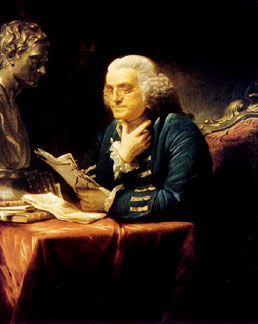This Week in History:
November 14 - 20, 1777
The Articles of Confederation
November 2010

Library of Congress Benjamin Franklin |
This week, we turn our attention to a seldom examined, but significant event in United States history, the Nov. 15, 1777 agreement by 48 members of the Continental Congress to the Articles of Confederation. This document, which was then sent to the various states for ratification, was the first attempt to establish a "perpetual Union" among the 13 American Colonies. While it is best known for its failures, the battles that occurred over its adoption, and the reasons for its being superseded by the U.S. Constitution, should be much better understood by our citizens today.
It was Benjamin Franklin, the universal genius who should be considered the prime founder of the United States of America, who first proposed "Articles of Confederation and perpetual Union." He took that action on June 21, 1775, considerably before the Declaration of Independence, but after the Revolutionary War had already commenced in earnest. In fact, this was the second time Franklin had explicitly proposed such a union, the first being the 1754 Albany Plan of Union, which called for unification under one governor, one grand council, and common funding through a liquor tax.
In Franklin's 1775 draft, there are many foreshadowings of the later Constitution, especially in respect to establishing the purpose of the government as providing for the "general welfare." We cite articles II, V, and VI [spelling as in original]:
"II. The said United Colonies hereby severally enter into a firm League of Friendship with each other, binding on themselves and their Posterity, for their common Defense [and Offense], against their Enemies for the Security of their Liberties and Propertys, the Safety of their Persons and Families, and their [common and] mutual and general Welfare."
"V. The Congress shall also make [and propose] such general [Regulations] Ordinances as tho' necessary to the General Welfare, particular Assemblies [from their local Circum-] cannot be competent to...."
"VI. All charges of Wars, and all other general Expenses, to be incurr'd for the common Welfare, shall be defray'd out of a common Treasury...."
Franklin's draft, however, was rejected, as the Congressmen attempted to maintain independence of action for the States, and, in some cases, to avoid a final break with England. Thus it was not until the fall of 1777, a point at which the British offensive had driven the Congress out of Philadelphia, that the Congress finally battled out an agreement on a Confederation.
The changes were devastating. Franklin's Article V, the broad grant of power to the Congress to provide for the General Welfare, was no longer there. The creation of a "General Congress" (called a Council of State), to run the government, was replaced by a "Committee of the States," which depended upon at least nine out of the 13 states approving any particular action. This "committee of states," subject to this rule, was left to carry out the executive actions for the Confederation, in the absence of the Congress. This was truly a "states' rights" kind of federation, in which only limited sovereignty was given to the Confederation
Most important of all, the new Confederation had no power to raise money to do what it determined was necessary, even for the limited purposes of war and defense. It depended upon monies requisitioned from the several states. Not only were these unreliable, and slow in coming, but the Confederation itself was not approved in the states of Delaware and Maryland until 1779 and 1781, respectively.
That the practical result of these limitations was disastrous, became more and more obvious as the years went by. The lack of resources for the Army nearly led to disaster, and the positive actions required to bind the nation together in peacetime—through commerce, infrastructure, and the like—were totally out of sight. It was clear to those who were committed to the establishment of the new republic, that the unified concept of One Nation, with a government endowed with the powers to provide for the General Welfare, was needed, if the United States of America were to survive.
Those today, who agitate for having our Constitution revert to a Confederation form of government, should be recognized for what they are: either deluded fools, or the malevolent Tories whom Franklin Delano Roosevelt, the President who did the most to establish the General Welfare clause of the Constitution as an operative principle, identified as such.
The original article was published in the EIR Online’s Electronic Intelligence Weekly, as part of an ongoing series on history, with a special emphasis on American history. We are reprinting and updating these articles now to assist our readers in understanding of the American System of Economy.
